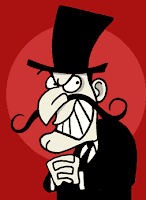A good villain must be powerful. Limpwristed villainy does not make for a good story. If they are not a sizable enough threat, then the hero becomes meaningless. The villain's villainy must be a true challenge so that the hero's heroism will count for something (both for the hero and those that he rescues). In short, pathetic villains make pathetic heroes, and both make pathetic stories.
Having said all that, we must not make the mistake of misunderstanding the nature of evil. A villain may be powerful, but that does not mean that evil is a source of energy and vitality. In fact, whatever energy that a villain has comes from those parts of them that can still be called (by themselves) "good": his natural-born strength or cunning, or his accumulated wealth, or his basic desires. This is because only what is good can produce energy. Only the good can produce life. And only the good can become evil. Evil cannot create. It only corrupts. It preys upon desires and talents, twisting them into what may seem energetic at first. Twisted desires conceive (a very vital activity) and bring forth sin; but when sin finishes, it brings forth death, not life.
A villain may be powerful, and in stories they must be powerful; but we must not leave off showing where their evil leads them: to the cold, wasted halls of death. Living death, if you will. Evil is vampiric. It drains away all life, even what it has corrupted to its purposes; and every villain, no matter how powerful, will be sucked dry, until even their very lusts wither away into nothingness.
-Jon Vowell (c) 2011















I really like this one.
ReplyDelete